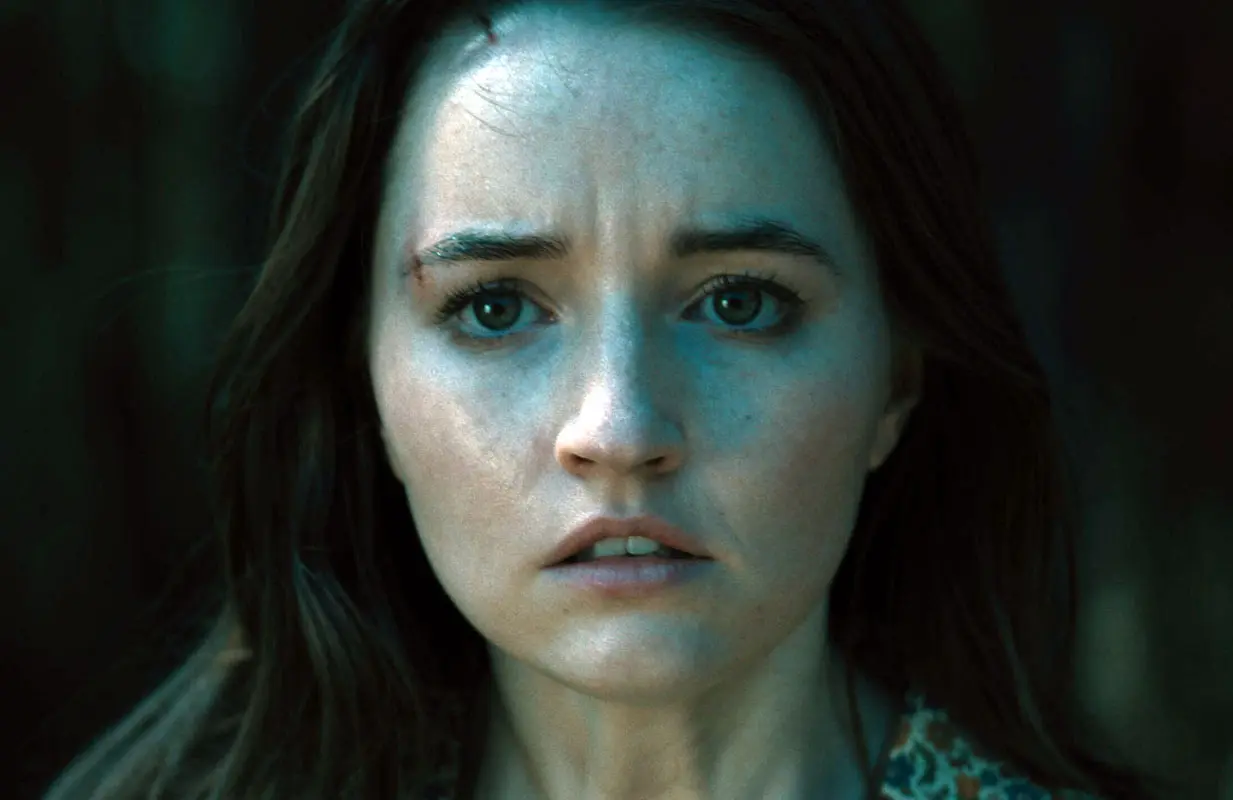Missing The Twilight Zone? Check Out Hulu's No One Will Save You
-
 Kaitlyn Dever in No One Will Save You (Photo: Hulu)
Kaitlyn Dever in No One Will Save You (Photo: Hulu)It takes about 10 minutes of wordless character- and world-building to realize no one is really going to speak in No One Will Save You. It's a gimmick, certainly, but in the hands of writer-director Brian Duffield, it's also a high-concept window into a story about guilt and isolation. Since being released directly to Hulu on September 22, the film has been trending and attracting glowing reviews from critics and horror luminaries like Guillermo Del Toro and Stephen King.
NO ONE WILL SAVE YOU: Brilliant, daring, involving, scary. You have to go back over 60 years, to a TWILIGHT ZONE episode called "The Invaders," to find anything remotely like it.
— Stephen King (@StephenKing) September 25, 2023
Truly unique.King's praise references a 1961 episode of The Twilight Zone, "The Invaders," in which Agnes Moorehead plays a woman who has to fend off an alien invasion while alone and isolated in a nearly dialogue-free episode.
The similarities in plot between the two projects don't make No One Will Save You any less impressive. If we threw out any horror fiction that bears a similarity to a Twilight Zone episode, we might not have any horror fiction left. Instead, it's a reminder that the Twilight Zone aesthetic remains as influential today as it's ever been, and it provides the most perfect template for small-screen horror.
Premiering in 1959 and running for over 150 episodes in its original incarnation, The Twilight Zone is one of TV's greatest triumphs of tone. You know a Twilight Zone episode the minute you land on it, with its air of straight-faced surreality, presenting a world only slightly off from our own, at least at first.
No One Will Save You has a similar slow-burning surreality. There's no plot-dictated reason for the no-dialogue conceit. The world hasn't been struck mute, as in Buffy the Vampire Slayer's "Hush" episode, nor are there monsters attracted to sounds like in A Quiet Place. The wordlessness is a reflection of the film's lead character, Brynn (Kaitlyn Dever), who lives all alone in a huge two-story house and has gotten used to not interacting with anyone. This is a girl with no family or friends; in town, sometimes people sneer at her, sometimes they spit. It doesn't make much sense at first, that this perfectly pleasant young woman who collects dollhouses and is trying to learn ballroom dance with those footstep outlines you put on the floor would be a social pariah.
The intrigue over what brought Brynn to this isolated existence takes a back seat to the sci-fi plot of the film, an alien invasion that seems — due mostly to our limited scope — to be localized entirely at Brynn's home. Duffield's presentation of the alien invasion isn't incredibly sophisticated, and his liberal borrowing from movies like Signs, Nope, and even Scream can ride the line between homage and rip-off, but they fit with the retro-simplistic design of the aliens themselves. These are the long-limbed, bulbous-headed green aliens we've envisioned in our heads since the '50s, which takes the film even further down the Twilight Zone rabbit hole.
But it's really in the ending that No One Will Save You most resembles a Twilight Zone tale. We eventually discover the terrible event from Brynn's past that has brought her to this isolated place in her life. A combination of a town's scorn and her own crushing feelings of guilt have kept her prisoner in her own home. Without spoiling how the film arrives at its resolution — though noting that it borrows a lot from Alex Garland's Annihilation — the changes it brings to Brynn's world offers the same kind of bright cloud/dark lining outcome that The Twilight Zone specialized in.
All the best Twilight Zone episodes really nailed the ending — think the gremlin on William Shatner's airplane wing or poor Burgess Meredith with his post-apocalyptic stash of books and no glasses with which to read them in "Time Enough At Last." Here, Brynn ends up with the life she's longed for: assuaged of her crushing guilt, in a shining, gleaming town full of people who smile at her and want to dance with her. It's everything she could have hoped for, in the most perverse and surreal way. Kaitlyn Dever's perfectly unsettling strained smile as the movie ends communicates so much unease at this idyllic outcome.
Horror works best as closed-ended stories, and The Twilight Zone, with its episodic anthology format, has always been the ideal guidepost for TV-sized terror. The show told standalone stories that were held together as a series by its iron-clad grasp on tone. It's a formula that's been replicated successfully by shows like Black Mirror, as well as by Jordan Peele in the short-lived remake on CBS All Access (now Paramount+). Peele's version included one standout episode, the Steven Yeun-starring "A Traveler," that took a less action packed but stylishly stark approach to an alien invasion story.
No One Will Save You isn't part of a series, but it's also not a theatrical feature. There's often a kind of disconnect when theatrical horror gets punted to television; the films feel out of their element. But a movie like No One Will Save You, with its obvious similarities to The Twilight Zone is right at home on TV, where it feels plugged into a decades-long tradition of impeccable world-building and unsettling resolutions.
No One Will Save You is streaming on Hulu.
Joe Reid is the senior writer at Primetimer and co-host of the This Had Oscar Buzz podcast. His work has appeared in Decider, NPR, HuffPost, The Atlantic, Slate, Polygon, Vanity Fair, Vulture, The A.V. Club and more.
TOPICS: The Twilight Zone (1959 series), Hulu, No One Will Save You, Brian Duffield, Kaitlyn Dever